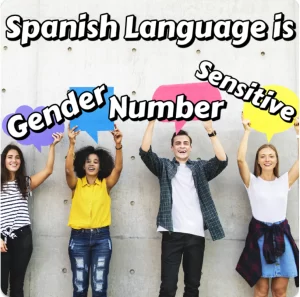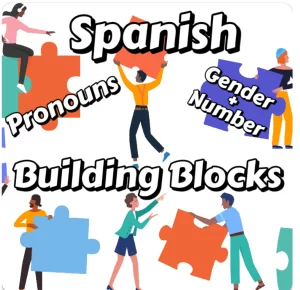
Spanish Pronouns
How to Memorize Los Pronombres en español:
Don’t translate words from one language to the other! Use your senses!!!! Use your eyes! Your brain perceives the world through all of it’s senses. Your environment is old knowledge so when you use it to learn something knew you get build a strong “memory anchor”. Take Spanish in Atlanta’s beginner Spanish class for professional help, feedback and Spanish instruction!
Examples:




Use Natural Environment to Learn Spanish Personal Pronouns:
The images above represent what we see everyday! Everyday you have opportunities to “tag” your environment with the new Spanish words you are learning. This strategy is excellent not only to memorize and practice the personal pronouns but any Spanish vocabulary! Spanish in Atlanta uses clever unique strategies for Spanish language learning! Use our free tip for everyday Spanish learning!

Want to learn Spanish Online with Us?
Our Spanish courses are all conducted live via Zoom! Practice your Spanish & get professional feedback and support! We also offer tutoring for self study students that need a little help to get unstuck.
Talk to our professional Spanish instructor 1 on 1 and get the answers you need before signing up!
Get a Free Spanish Assessment & Placement Test! Talk to our professional Spanish instructor & get expert guidance; find out what level of Spanish is right for you!
Spanish in Atlanta’s classes, lessons and tutoring are the highest rated Spanish language classes in Atlanta, Chicago, Houston & all over the USA!







10 Comments
I’ve been learning Spanish and I’m a little confused about the pronouns “vos” and “vosotros.” Could you explain the difference between them? Also, how many countries actually use these pronouns? I know “vosotros” is common in Spain, but I’m not sure about “vos” or where it’s used. Any tips or resources to help understand them better would be really helpful. Thanks in advance!
I’ve been wondering if Spanish pronouns change depending on the country. Do different Spanish-speaking countries use different pronouns? I know about “tú,” “usted,” and “vosotros,” but are there other pronouns used in some places that I should know about? Any insight on regional differences with pronouns would be really helpful. My boyfriend is Spanish and he has no patience LOL. I try to ask him to help me learn Spanish but he is a bad teacher.
Spanish in Atlanta. Gracias! So informative. I would like the free Spanish pronouns worksheets, make a part 2 porfavor 🙂
Muy bien! Spanish in Atlanta is on it! 🙂 Support our content, share it and comment. This helps us make the time to create more free content.
I didnt realize how important spanish pronouns were to speaking Spanish. No wonder its hard for me to converse in Spanish hahahha. I am a big math person and I can see that there is a formula for learning spanish as well. I really love love your posts. I have been able to see Spanish in a different light. I will check out all your posts. Make more please.
I’ve been learning Spanish and I’m a bit confused about when to use “tú” versus “usted.” I know “tú” is informal and “usted” is more formal, but I’m not sure in which situations to use them. Do all Spanish-speaking countries use both, or does it change depending on the country? I’ve heard some places use “usted” more often, even in casual conversations. Could you explain the differences a bit more and when each should be used? I love your posts!!
Hola Leo, best way to think of it is Tu = friends, kids, people you feel comfortable with. USTED= formal situations, elders, business and the workplace, authority figures etc…
Think of TU as jeans and a tshirt and USTED as a nice dress or suit. The Spanish words you use are like the clothes you chose to wear. Going to a formal event vs a barbecue.
All Spanish speaking countries use USTED; only Costa Rica & Ecuador don’t use TU. Spain use VOS and VOSOTROS but they also use USTED & TU. I hope this helps you Leo!
This is exactly the kind of content I’ve been looking for.I just read your blog post about Spanish pronouns, and it was super helpful! I’ve been struggling to get a handle on when to use “tú” versus “usted,” and your explanation made it much clearer. The examples you gave were really practical and easy to follow. I also liked how you broke down the different subject pronouns and included some tips for remembering them. It’s definitely made a difference in my confidence when speaking Spanish. Thank you for creating such useful content—looking forward to reading more posts like this in the future!
We are so happy to hear that Vivian! The easiest thing to do is use USTED. If you use TU and you didn’t mean to, no worries! It will be rare if anyone gets offended. Costa Rica and Ecuador don’t use Tu at all. Spanish in Atlanta will be posting more Spanish blog posts, if we get more comments. Let us know what you would like us to cover next!
I’ve always struggled with memorization, especially when it comes to learning new vocabulary. It’s like no matter how much I study, the words just don’t stick sometimes! Does anyone have tips on how to memorize Spanish vocabulary more effectively? I’ve tried flashcards and repetition, but I’m looking for new strategies to really improve my memory.
Gracias Spanish in Atlanta. Your posts have helped me!